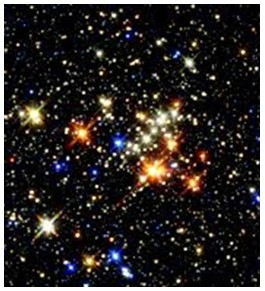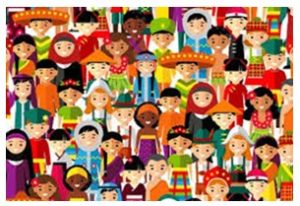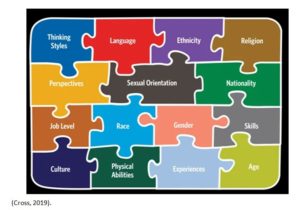© 2021 Marion Steward
© 2021 ANZURA, Australia & New Zealand Urantia Association
By Marion Steward, Auckland, New Zealand
¶ A Never-Ending Adventure
[This article is based on a presentation made as part of Urantia Association’s Urantiathon, held on 30 January, 2021]

Diversity is one of the dominant aspects of the universe as described in The Urantia Book. It pervades all of the grand universe, including spiritual and ascending beings and the physical environments. Diversity presents challenges to us all as we go about our daily lives, but because of its never-ending and constantly expanding presence, it is very important to learn how to deal with it here on Urantia in preparation for our future universe career.
The article will first outline the scope and range of diversity in the Universe, and portray just how individual and varied almost everything is. It will focus first on what can be called outer diversity – how the appearance and form of almost everything and every living being varies in the universe, and of course on our planet. This will be followed by a brief overview of what I have called inner diversity, which is some of the main ways in which people can vary, including mental, emotional, social, racial, cultural and personality. The next section will discuss how diversity is part of God’s plan for the universe, and is never-ending, followed by a brief outline of how this diversity presents challenges to us in the world today. Finally, there will be a discussion of what Jesus had to say about this aspect of life, and how his advice might be applied, in very broad terms. to the situations we might find ourselves in in our everyday lives.
¶ Outer Diversity in the Universe

In terms of appearance and form, diversity and uniqueness begin with Havona. In this central universe which surrounds the Isle of Paradise, there are one billion words, each of which is unique.
The architecture, natural embellishment, morontial structures, and spirit creations are exclusive and unique on each sphere. Every world is a place of everlasting beauty and is wholly unlike any other world in the central universe. UB 18:2.4
A consideration of this fact highlights the incredible range of variation that is possible when it comes to the physical worlds.
The Creator Sons and their local universes continue this theme.
…each [Creator Son] is unique, diverse, exclusive, and original in nature as well as in personality. And since they are the architects and makers of the life plans of their respective realms, this very diversity insures that their domains will also be diverse in every form and phase of Michael-derived living existence which may be created or subsequently evolved therein. UB 21:2.10
It is clear that all the spiritual beings created to run our universe, and every other living creature on every planet, will be a bit different to each other, and different from equivalent beings in other local universes.
¶ Mortal Physical Diversity

Then, when it comes to ascendant beings on the planets, the same approach of constant variety is very evident, and even more so on Urantia, due to our status as an ‘experimental’ planet.
The Urantia Book tells us that there are basic life patterns, but lots of variation.
[The Life Carriers] foster a generalized system type of mortal creature, but there are seven distinct physical types as well as thousands upon thousands o minor variants of these seven outstanding variations UB 49:2.1.
These types vary in a number of ways, including atmospheric types, elemental types and gravity types. This leads to such fascinating beings as non breathers, and mortals who can navigate the air or the water, as well as one, two and three brained people.
On top of all this, there are the racial variants, possible the most visible aspect of diversity on our planet. We had six, in the Sangik family, and most planets have either three or six (64:6.26; 726.2).
¶ Inner Diversity
In addition to the wide scope of visible diversity, there is an even greater range when it comes to less visible aspects of intelligent beings in the universe. The most powerful is personality. Of all the things that add to the diversity of individual mortals across the Grand Universe, the most significant and influential is the uniqueness of each God-given gift of personality.
[Personality] is unique, absolutely unique. It is unique in time and space; it is unique in eternity and on Paradise; it is unique when bestowed – there are no duplicates; it is unique during every moment of existence; it is unique in relation to God… [UB 112:0.12].
So the point is emphatically made that each of has an utterly unique personality, which will affect everything about how we see and react to the world around us.

In addition to personality, many other aspects will also influence who and how we are, including race, family, culture and many other things. These are illustrated in this diversity jigsaw.
This is a fairly thorough overview of the main aspects of variation. Most of them are straightforward and need no explanation. Thinking styles refer to the different ways that people approach a task, which can be analytical, critical, creative or divergent. Ethnicity and Race are noted as 2 separate aspects. Definitions of these aspects vary enormously in themselves, but one simple definition is that Race relates to physical traits, while Ethnicity refers to a broader range of commonalities in a group, including race, and also culture and religion.
¶ Diversity As Part of God’s Plan
All of the above information and many other statements and descriptions in the Urantia Book show that diversity is very much a linchpin of the Divine plan of creation. After all, the original act of Creation (acknowledging that this did not actually happen linearly) was one where the First Source and Centre decided to diversity him/herself. This focus on individuality, uniqueness and constant diversification pervades the universe, and even when beings are created or eventuated as perfect beings for their function, they still manage to become individualised.
Creature-trinitized sons are an extraordinary example of the constant diversification of creation. This is where two mortal finaliters, who have ‘independently come up with an original concept, that has not been trinitized before”, are given permission to create a being who embodies this concept (UB 22:7). So even a new, original thought can become an independent living being.
And all of this diversification is a never-ending process.
And it is altogether possible that the continued diversification of the original reality of the First Source and Center may proceed onward and outward throughout age upon age, on and one, into the faraway and inconceivable stretches of absolute infinity UB 105:7.18.
¶ The Never-ending Adventure
So God creates the universe to be richly and eternally diverse, and intentionally ensures that each living being of the uncountable and ever increasing number of beings in unique in some way, then also ensures that these beings, particularly the mortal ascendant ones, are required to learn how to work together to achieve group goals and tasks.
One of the most important lessons to be learned during your mortal career is teamwork. The spheres of perfection are manned by those who have mastered this art of working with other beings UB 28:5.14.
Luckily, guides and teachers are also provided, as this is quite a daunting task. On the planets and the mansion worlds, there are racial interpreters and race commissioners.
On the worlds of time the seraphic racial interpreters further the efforts of the race commissioners to harmonise the varied viewpoints of the races, and they continue to function on the mansion worlds, where these same differences tend to persist in a measure UB 48:6.22.
Even after fusion with our Adjusters, this process of learning to work with others continues. Post-fusion, an ascending mortal is described as “a candidate for further growth and development” (112:7.9, 123.4).
A key part of this further growth appears to be the continuing training in working with other diverse beings.
[On Jerusem] you achieved the willingness to submit the self to the disciplines of group activities and co-ordinated undertakings; but now on the constellation training worlds you are to achieve the real socialization of your evolving morontial personality UB 43:8.4.
This paper gives a very detailed description of this training, which is conducted by the Univitatia, children of the Creator Son and the Creative Spirit. There are, naturally, 70 diverse orders of personality of Univitatia, and their purpose is to preside over the special training and cultural schools on the Edentia training worlds. Our training consists of a series of placements among Univitatia. We must “live happily and work effectively” with 10 univitatia, at first, and then over time more of our fellow morontial mortals join us until there are finally 10 morontial mortals and 10 univitatia in the same group, who are all abiding joyfully and co-operating heartily! (UB 43:8.1). This section refers quite realistically to the need to improve our ability to live with diverse beings with “ever-lessening irritability and ever-diminishing resentment”. It is not difficult to project this experience on to Havona and then our adventures as finaliters, bearing in mind that we are never sent back to the same superuniverse we came from, and each superuniverse is different from the others.
¶ The Challenges of Diversity on Urantia
In the section on the different coloured races on Urantia, and on other planets, one of the stated reasons for doing it this way is “the development of human tolerance and altruism” (UB 64:6.34).
Elsewhere it is also stated that the material-comfort era in which we live is often characterized by intolerance (UB 50:5.3).
It would appear, then, that intolerance of diversity is the one of the greatest challenges we face in our career on Urantia. Intolerance is defined as “unwillingness to accept views, beliefs, or behaviour that differ from one’s own” [Google dictionary], and in The Urantia Book, it is described as “everlastingly inimical to human progress” (UB 71:3.2). These are strong words indeed, and yet we live in a world where intolerance is as pervasive as diversity, as a quick scan of news articles on any day will highlight.
The jigsaw pieces of human variation shown above illustrate all the triggers of intolerance in our world.
This is currently being exacerbated by the increasing and more visible diversity on the planet. The Internet, in particular social media, makes diversity more visible. Increased migration, including more and more refugees, are forcing societies that were previously much more homogenous to adjust to groups of people from very different cultures. In addition to this, there is increasing acknowledgement and legal protection of a range of individual differences in more and more countries- some examples of this are homosexual law reform, the legalising of same sex marriages, and the legalisation of prostitution in New Zealand in recent years, all of which many people find extremely difficult to accept and/or tolerate.
¶ Advice from Jesus on How to Meet These Challenges
How can these challenges be met successfully? How can intolerance be reduced so that the human race can make progress? Jesus discussed this on a number of occasions with the apostles, who did not have the same views about many things. His advice was that they did not have to have the same opinions in order to achieve shared goals. Here are two of his comments to them:
“The religion of the spirit requires only unity of experience – uniformity of destiny – making full allowance for diversity of belief” UB 155:6.9.
“You do not have to see alike or feel alike or even think alike in order spiritually to be alike” UB 141:5.1.
Having the same purpose and the same ideals seems to be one of the best ways to move forward – to aim for unity, not uniformity.
Diverse opinions are inevitable and need to be expected and accepted as part of the rich diversity of creation.
¶ What About Non-spiritual Unity?
Often the group you are in where differences are apparent and perhaps causing friction does not have a spiritual aspect to it. This group might be at work, sport, or in a social context, in which case other non-spiritual things that can provide this unity need to be identified, such as a shared purpose, a common ideal, some other commonality in the group that can overcome intolerant reactions.
In my experience, this is a slow, piece by piece growth, and can take time. I would like to share an example of this from my own life. It relates to a cultural difference at my work, which also has a spiritual aspect to it.
I work at a vocational institute which is government funded, and in New Zealand, this means that we are required to acknowledge and accommodate the customs and culture of Maori and Pacific Islands people. One of the customs is to open and close every meeting with a prayer. When this became common, required practice at all meetings I initially found this quite challenging. I realised after some reflection that my resistance to this practice stemmed from my English background and study of history at school, during which I had quite unconsciously absorbed the notion that the separation of church and state was the proper state of affairs. The ‘state’ included the secular domain of employment, so including religious prayers in a work meeting seemed quite misplaced to me.
However, a year or so ago, I was placed in a team of lecturers from different Pacific Islands, who placed high priority on the importance of beginning and ending every meeting we had with a prayer. These prayers were always in their languages, but the Samoan lecturer would translate for my benefit, and I noticed that the prayers would always include a blessing on us all, including myself. This felt very supportive and warm, and my resistance to prayers at work meetings slowly began to fade, not only because of the blessings, but also because I began to appreciate the value of this custom, in focusing every member of the team on the purpose of the meeting, and then at the end expressing thanks for everyone’s contributions. I could see the effect in building the sense of ‘team’, and the focus on our purpose for being together.
This process of slowly changing my intolerance to tolerance took more than a year, and I realised how much I had progressed when I recently found myself actually opening a meeting I was chairing with a prayer, which was calmly accepted by all attendees – I had moved from resistance and antagonism to tolerance, acceptance, and finally adoption of a different custom.
Equally importantly, I learned that accepted a cultural difference takes time, willingness to understand and experience.
¶ Conclusion
The key points I would like to emphasise are as follows:
- The Universe is extremely diverse in every way by design.
- We need to develop a perspective/mindset that is open and accepting of differences to prepare us for our eternal career.
- Learning to function effectively with diverse beings enriches and expands our abilities and our understanding exponentially.
Recognition that this is not an easy task is shown by the fact that there are lots of heavenly helpers who will guide us along the way, such as the racial interpreters and the univitatia. - A focus on something that unifies us will help us overcome the innate tendencies of mortal creatures to reject/oppose differences.
The acceptance of differences, one by one over time, will help us in our own personal development – as I tried to show by sharing my own experience.
This article is based on a presentation made as part of the recent Urantiathon, held on 30 January, 2021. The theme of this 24 hour online event was Faith, Joy and Peace. My final statement pays homage to this theme:
If we have faith in God’s eternal plan, and work steadfastly to overcome intolerant thoughts and behaviour, then, with each victory we will experience both joy and peace – until the next challenge comes along!
¶ References
-
Cross, L. W. (2019). Fostering an inclusive classroom: A Practical Guide. PECOP Blog. https://blog.lifescitrc.org/pecop/tag/diversity/